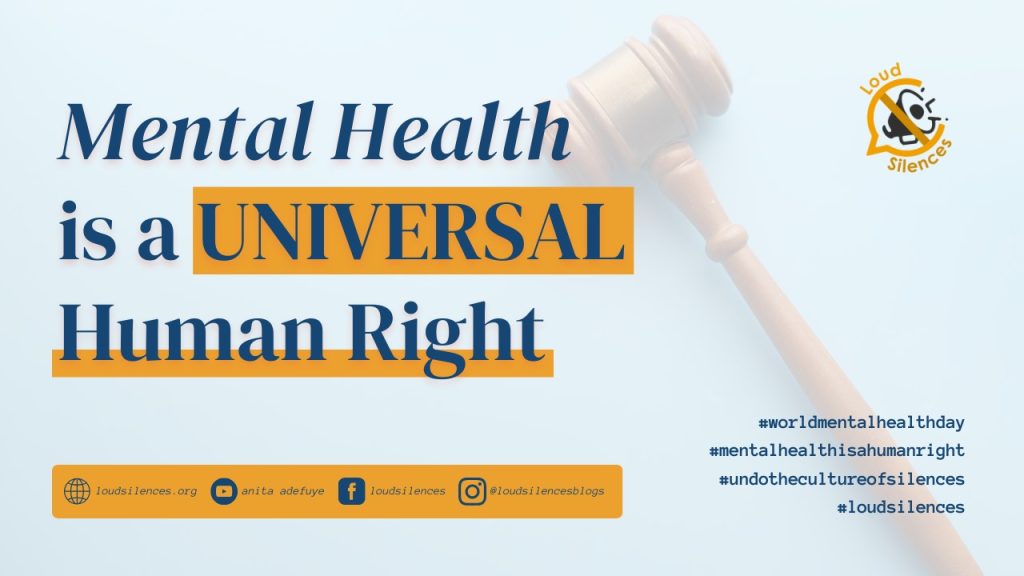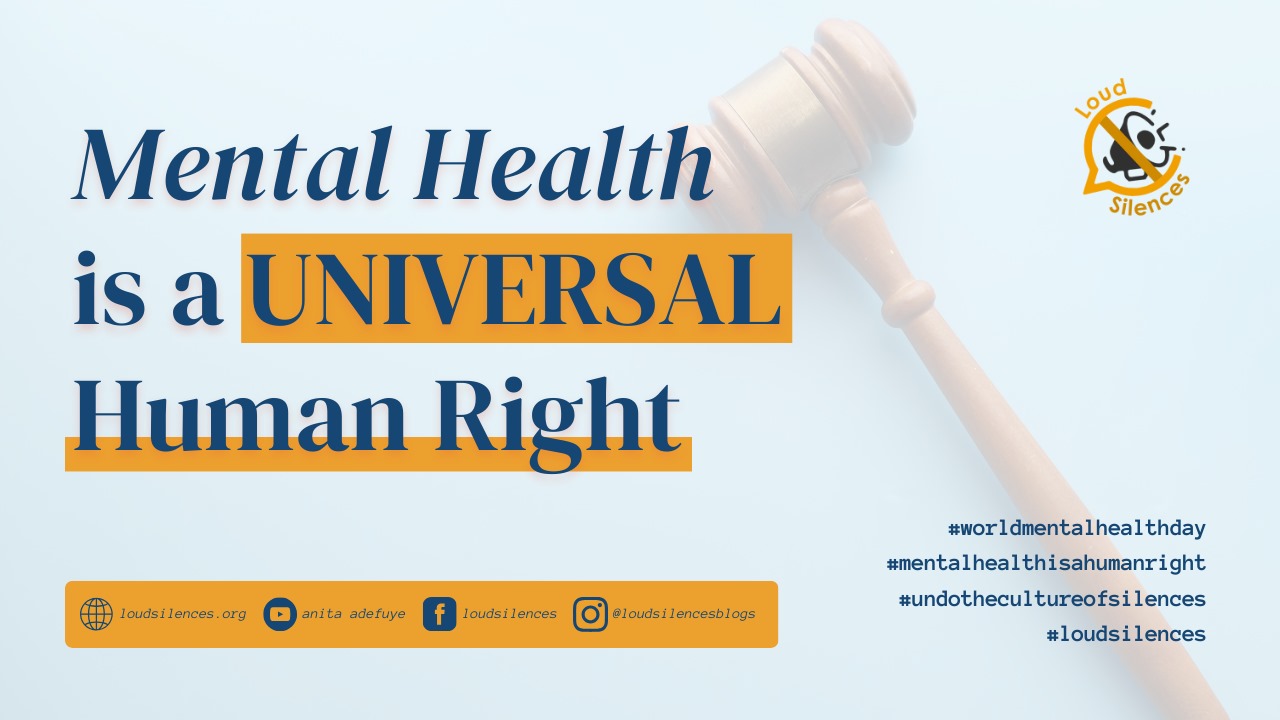Today is World Mental Health Day and the theme is ‘mental health is a universal human right’. On one side of things, we are encouraging people to open up about their mental health. Which is fantastically great, don’t get me wrong! However, while people are sharing their mental health struggles, many aren’t receive the sufficient care and support they nees.
In an era where human rights are important, it’s crucial to recognize that mental health is a key aspect of these rights. Mental health is not merely an absence of mental illness but a fundamental component of overall well-being.
“Mental Health is a universal human right.”
Mental Health Foundation
Mental Health as an Essential Component of Human Rights
The United Nations adopted the Universal Declaration of Human Rights in 1948, which explains the basic rights and freedoms that all people are entitled to.

One of the important aspects to consider when discussing human rights is that they apply to every person, regardless of their race, gender, nationality, ethnicity, language, religion, or any other status. These rights implicitly embed mental health within them.
- Right to Life and Security:
- Mental health is essential for one’s right to life and security.
- For this reason, individuals struggling with severe mental health conditions may face a higher risk of self-harm or suicide if they do not receive appropriate care and support.
- Freedom from Torture and Inhuman Treatment:
- Denying individuals access to mental healthcare or subjecting them to inhuman treatment is a violation of their right to be free from torture and inhuman or degrading treatment.
- Right to Health:
- Mental health is an integral part of health, and everyone has the right to enjoy the highest attainable standard of physical and mental health, as recognized by the World Health Organization (WHO).
- Non-Discrimination:
- Discrimination against individuals with mental health conditions is a breach of the principle of non-discrimination enshrined in human rights instruments.
Every individual deserves to have their mental health upheld as a fundamental human right
Blog Excerpt
How Human Right Comes Into the Picture
Why is mental health considered a human right? If we acknowledge various things as our rights, how does mental health fit into the concept of human rights? Here are four points explaining why mental health is considered a human right.
Inherent Dignity:
Every person has worth, and mental well-being is important in protecting and enhancing this worth. Moreover, refusing someone help for their mental health or treating them poorly because of their mental health condition goes against their worth.
Quality of Life:
Secondly, good mental health is essential for leading a fulfilling and productive life. Denying individuals the opportunity to access mental healthcare is a direct infringement on their right to a high quality of life. So, why should we get in the way of people having a high quality life?
Equality:
Just as we value our quality of life, recognizing mental health as a human right also promotes equality. In other words, it ensures that individuals with mental health conditions are treated with the same respect and afforded the same opportunities as those without such conditions.
Reducing Stigma:
Viewing mental health as a human right helps to break down the stigma surrounding mental illness. When society acknowledges that mental health is a fundamental aspect of human well-being, it promotes understanding and empathy.

How Can We Promote Mental Health as a Human Right?
- Awareness and Education: We must raise awareness about mental health as a human right through education and advocacy. Therefore, by promoting understanding, we can reduce stigma and discrimination.
- Policy Reforms: Furthermore, governments and institutions should make and enforce rules to make sure that everyone can get mental healthcare, reduce unfair treatment, and help promote mental health.
- Community Support: Communities play a crucial role in supporting mental health. So, Initiatives that foster supportive communities, provide resources, and encourage open dialogue can significantly impact the well-being of individuals.
- International Cooperation: Recognizing mental health as a human right encourages international cooperation to address mental health disparities globally. To illustrate, countries can share best practices and resources to improve mental health outcomes worldwide.
“Mental health…is not a destination, but a process. It’s about how you drive, not where you’re going.”
Noam Shpancer, PhD
Takeaway
Mental health is not a select few to enjoy its privilege; instead, every individual deserves to have their mental health upheld as a fundamental human right. Recognizing mental health as a human right is not only ethically imperative but also crucial for building a just and compassionate society.
By breaking the stigma, promoting awareness, and advocating for equitable access to mental healthcare, we can ensure that society treats mental health with the same importance as physical health. Consequently, we can create a world where all individuals have the opportunity to thrive and enjoy their full human rights.

Anita Adefuye, the author, shares her story of sexual abuse, low mental health, suicide, and how she overcame them all. Today, she is the founder of LoudSilences and more.
Her book, Reve-Healed – A true story of pain, healing, and hope, is available for purchase. Get yourself a copy today!

Leave a Reply